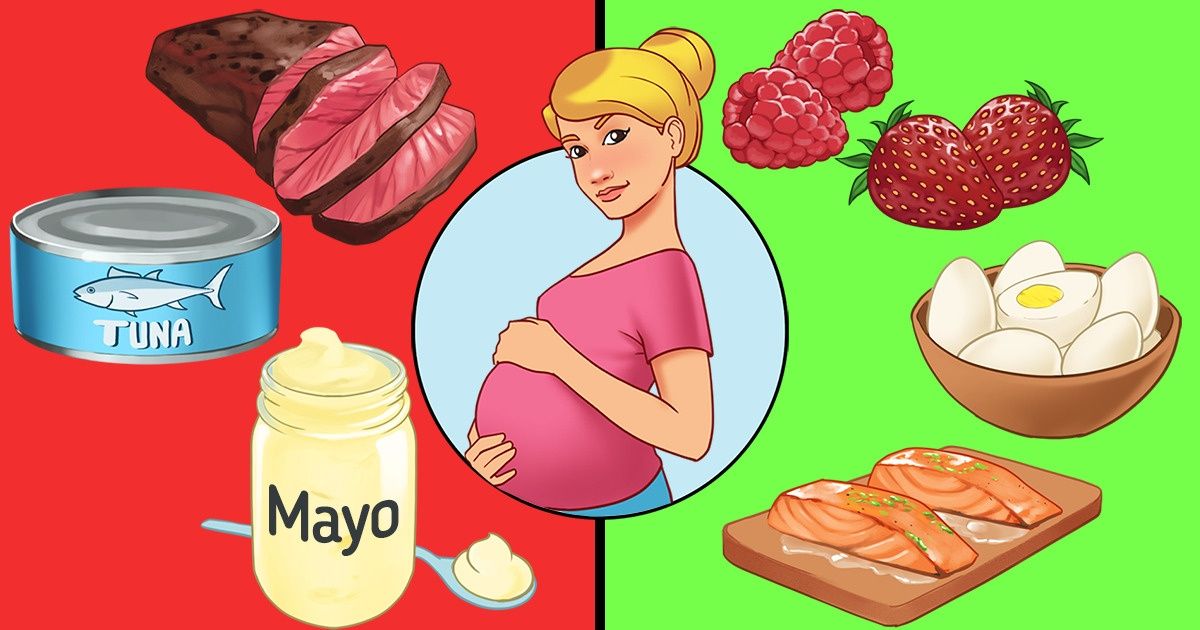
What to Eat During Pregnancy
A nutritious diet is essential while trying to meet the physical demands of pregnancy, assisting your baby in developing healthily. While most foods and drinks are safe in this process, there are others you should be extra careful with or avoid completely.
5-Minute Crafts has prepared this guide to help you know which foods you should include or remove from your diet during pregnancy.
⚠️ This article is for informative purposes only. Always consult your doctor about the diet that best suits your individual needs according to your medical history.
Foods you can eat if you’re pregnant:
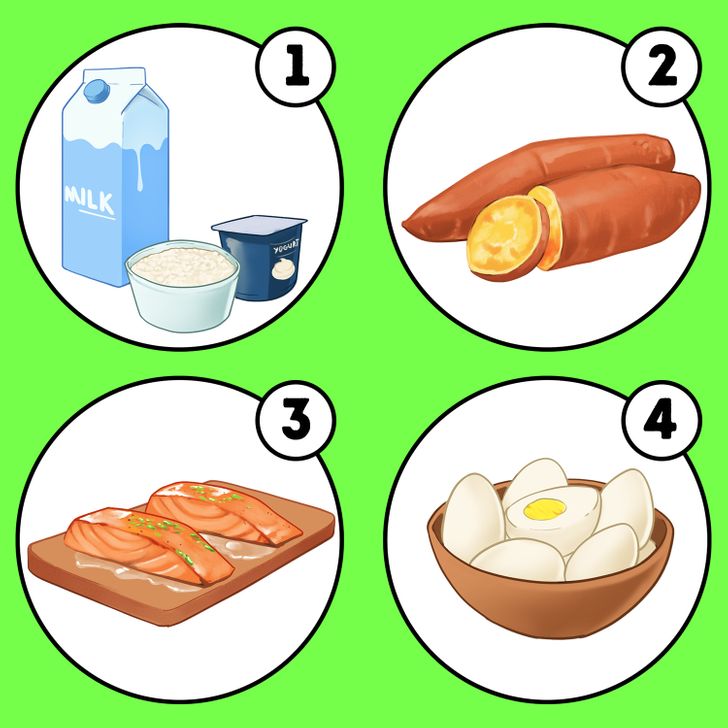
1. Dairy products: Milk, cheese, and yogurt can provide the extra protein and calcium you need during pregnancy. Additionally, they contain other nutrients, such as phosphorus, zinc, magnesium, and B vitamins. To ensure safe consumption, choose pasteurized products.
2. Sweet potatoes: They have high amounts of beta carotene, a compound processed into vitamin A that plays a vital role in your baby’s development. Sweet potatoes also contain fiber, making you feel satiated for longer, reducing blood sugar levels, and improving digestion.
3. Salmon: This fish is a good source of omega-3 fatty acids, which help develop your baby’s eyes and brain. Moreover, salmon can help lengthen the gestational time. Just remember to eat it fully cooked.
4. Cooked eggs: They have protein, fat, and a variety of vitamins and minerals. They also provide a good amount of choline, which is very important for your baby’s brain development. Additionally, it helps prevent specific problems in the brain and spine.
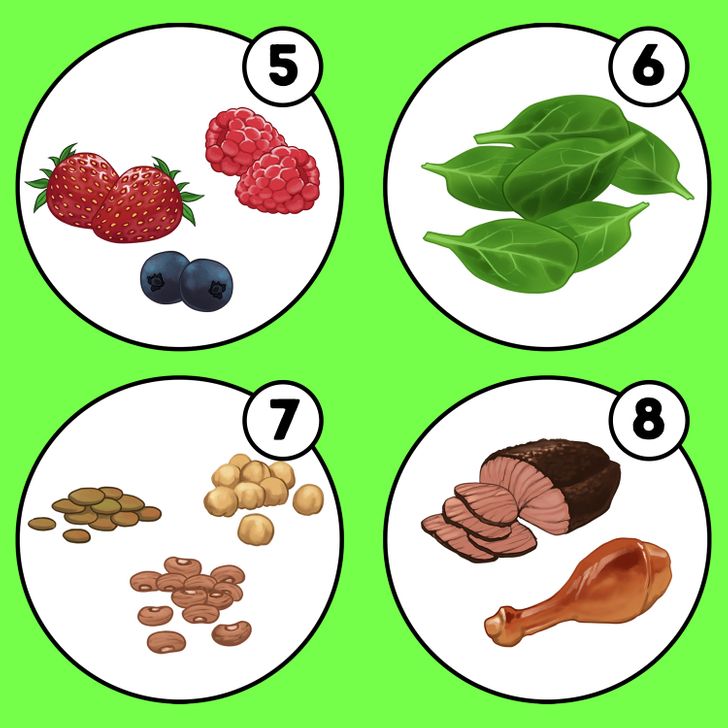
5. Berries: They can be a very healthy snack, as they contain water, healthy carbs, vitamin C, antioxidants, and fiber. Since they have a low glycemic index value, they should not cause a rise in blood sugar levels. Opt for berries like blueberries, raspberries, strawberries, goji berries, and acai berries.
6. Dark leafy greens: Vegetables, such as spinach and kale, provide fiber, vitamins C, K, and A, along with calcium and iron, among other nutrients. Moreover, they can help relieve constipation and are associated with decreasing the risk of low birth weight.
7. Legumes: Lentils, peas, chickpeas, beans, peanuts, and soybeans are excellent sources of fiber, protein, iron, folate, and calcium, which are much needed during pregnancy. Additionally, folate, also known as folic acid, is essential for you and your baby during the first months since it can prevent neural tube abnormalities.
8. Lean meat: Beef, pork, and chicken contain high-quality protein. At the same time, beef and pork are rich in choline, iron, and other B vitamins, which you need in higher amounts while you’re pregnant. For instance, good iron levels will help you prevent certain problems, such as iron deficiency anemia and low birth weight.
❗ Remember to wash fruits and vegetables thoroughly before consuming them to decrease the risk of infection due to contaminated foods.
Foods you should avoid if you’re pregnant:
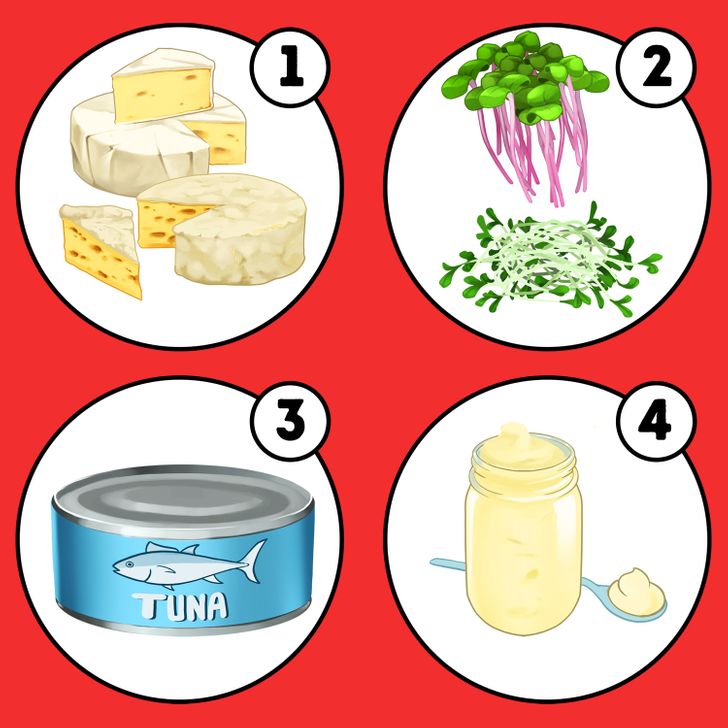
1. Soft, mold-ripened cheese: Cheeses like brie and camembert can be related to listeria contamination. Listeria is a type of pathogenic bacteria that can cause life-threatening infections in pregnant women and their babies. To prevent these complications, eat only pasteurized cheese.
2. Raw sprouts: When eating salads and other raw preparations, avoid ingredients such as alfalfa, clover, mung bean, and radish sprouts, as they can be contaminated with salmonella. These seeds require certain humidity levels to sprout, which results in an ideal environment for these resulting bacteria to appear. However, you may consume these sprouts if they are well-cooked.
3. High mercury fish: Mercury is an element that can be toxic to your nervous and immune systems, as well as to your kidneys. Since mercury can be found in polluted seas, large marine fish can have high quantities of this compound; it’s advisable to avoid fish like shark, king mackerel, marlin, orange roughy, swordfish, tilefish, tuna, etc.
4. Raw eggs: As they can be contaminated with the salmonella bacteria, it’s recommended to avoid raw or partially cooked eggs, such as lightly scrambled or poached eggs. Additionally, avoid foods that can include raw eggs, such as hollandaise sauce, homemade mayonnaise, cake icings, and salad dressings.
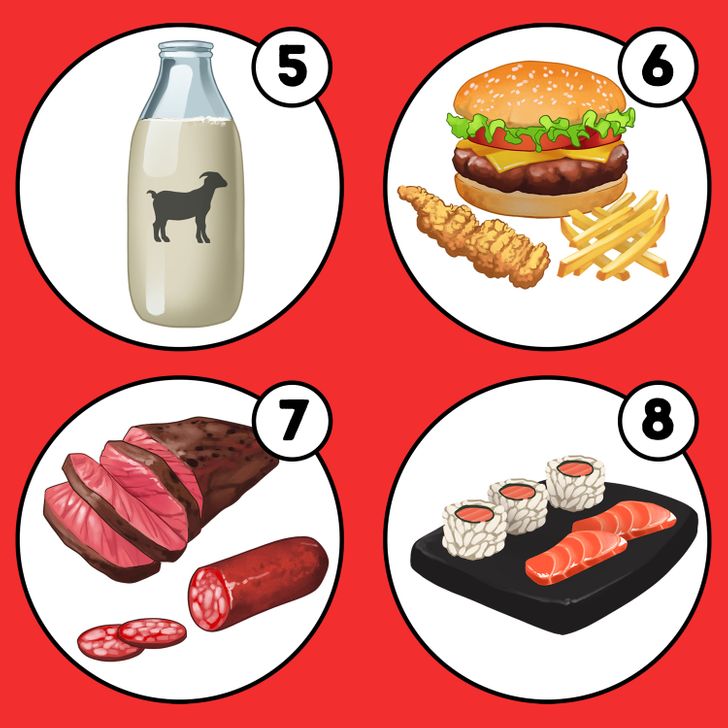
5. Unpasteurized milk and fruit juice: Raw milk can contain different types of harmful bacteria, such as listeria, salmonella, E. coli, and campylobacter. This also applies to unpasteurized juice, which can be susceptible to bacterial contamination, causing life-threatening infections for your baby.
6. Processed junk food: These foods are low in nutrients and contain high amounts of calories, sugar, and fat, which is the opposite of what you need during your pregnancy. Also, junk food can lead to weight gain, resulting in an increased risk of gestational diabetes and other birth complications.
7. Raw and cold cured meats: Eating raw or undercooked meat can increase the risk of infection from bacteria and parasites, such as Toxoplasma, E. coli, listeria, and salmonella. This can lead to severe conditions in your baby’s development, including neurological illnesses, blindness, and epilepsy. Since they’re not cooked, it’s also advisable to avoid cold cured meats, such as salami, pepperoni, chorizo, and prosciutto.
8. Undercooked or raw fish: These can cause viral, bacterial, and parasitic infections, including norovirus, Vibrio, salmonella, and listeria. While some can only affect you, others can threaten your baby’s health with serious consequences, including miscarriage.